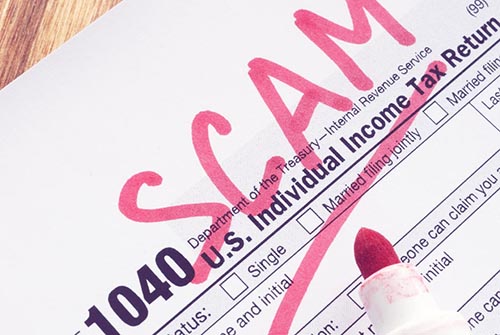Tax season is already stressful enough for many, but to make matters worse, scammers tend to be extra active during this time of the year and have a variety of tactics to steal personal information. In fact, according to the Internal Revenue Service (IRS), $5.7 billion was flagged for tax fraud in 2022. That’s a lot of fraud!
At Advia, we want to help you spot the warning signs of these types of scams and know how to avoid them.
What are tax scams?
Tax related scams happen when a fraudster pretends to work for the IRS or other government agency to steal your personal information. You may receive a phone call, text message, or email. The goal of the scammer is to steal your identity and use it to file claims in your name, or to steal money directly from you by claiming you owe fees.
Common Tax Scams
When doing your taxes this year, there are a few common scams to be on the lookout for. Some common scams include:
- Gift Card Scam: According to the IRS, scammers will tell people that they owe federal taxes and could be in legal trouble. This is a complete scare tactic. The scammer will demand the individual pay a penalty fee as well as send over various gift cards. This is something the IRS would never do; if you receive such a request, hang up immediately.
- Social Security Administration Scam: If you receive a call or text claiming your Social Security card has been canceled, hang up! This is a scam. According to SSA.Gov, your Social Security card will never be canceled or suspended. If there’s ever an issue with your Social Security number, you will receive an official letter by mail. Plus, Social Security will never require payments over phone or wire, ask for personal details or banking information, or suspend your Social Security number. You can report these scams here!
- The Refund Scam: Another common scam is when criminals call someone and tell them they are owed more money than they were originally told. This excites people because they think they have more money waiting for them! Unfortunately, with this scam, the fraudster will gather your personal details and then steal your information. There’s not actually more money for you. Do not fall for this.
Not only will the IRS almost never call you, but they will also NEVER ask for personal information over the phone. If you think you may have received a call from a tax scammer, we encourage you to file a report to the Federal Trade Commission or your state’s consumer protection agency.
Stay safe this tax season!
Sources:
Internal revenue Service (IRS): https://www.irs.gov/pub/irs-pdf/p3583.pdf
Social Security: https://www.ssa.gov/scam/#anchor6

